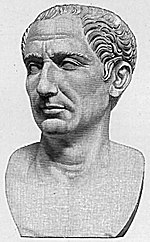

Poems by Julius Caesar are mentioned by several sources in antiquity.[1] None are extant.
Plutarch says that verse compositions were among the entertainments Caesar offered the Cilician pirates who captured him as a young man in 75 BC.[2] Pliny places "the divine Julius" on his list of serious men who wrote not-so-serious poems.[3] Caesar's Dicta Collectanea, a collection of his memorable quotations, is assumed to have contained quotations from his verse as well as prose works.[4]
The titles of two works Caesar wrote as a young man are known, a Laudes Herculis ("Praises of Hercules") and the verse tragedy Oedipus; their planned publication by the librarian Pompeius Macer was squelched by a "short and simple" — or perhaps "curt and direct"[5] — letter from Caesar's heir Augustus as incompatible with his program of deification. A third title, Iter ("The Journey"), dates from 46 BC, composed during a 24-day trip from Rome to Spain during the civil war.[6] This verse travelogue may have been modeled after Lucilius's poem about a trip to Sicily.[7] Caesar's choice of writing as a pastime in prelude to the decisive and brutal Battle of Munda illustrates the dual preoccupations of the Late Republican aristocrat, with militarism and political power-plays balanced by elite intellectual and aesthetic aspirations.[8]
- ^ Pliny, Natural History 19.8.144; Tacitus, Dialogus de oratoribus 21; Suetonius 56; Nonius Marcellus fr. 15; Isidorus, Etymologiae 4.12.7; Firmicus Maternus, Matheseos 2. pr. 2.
- ^ Plutarch, Life of Caesar 2, Bill Thayer's edition at LacusCurtius online.
- ^ Pliny, Epistulae 5.3.5, Latin text at The Latin Library.
- ^ Gian Biagio Conte, Latin Literature: A History (Johns Hopkins University Press, 1994), p. 226 online.
- ^ Brevis et simplex.
- ^ Suetonius, Julius Caesar 56, Bill Thayer's edition at LacusCurtius online.
- ^ Lucilius 3; Courtney, Fragmentary Latin Poets, p. 187.
- ^ Llewelyn Morgan, "Escapes from Orthodoxy: Poetry of the Late Republic," in Literature in the Roman World (Oxford University Press, 2000), pp. 336–339 online.
© MMXXIII Rich X Search. We shall prevail. All rights reserved. Rich X Search
